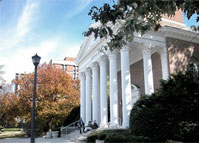Economics 684: Game Theory, Spring 2019
Instructor: Jeremy A. Sandford
Office phone number: 202-326-2766
email:jsandford@jhu.edu
Lecture: 6:00-8:40pm Thurs, Washington DC Center, room 213
Homework #1, answers
Homework #2, answers
Homework #3, answers
Homework #4, answers
Homework #5, answers (corrected April 30, 2019)
Schedule
Thursday, January 24: Introduction, normal form games, dominated strategies, Nash equilibrium, best response functions
reading: Gibbons, chapter 1
optional readings: The poison scene in The Princess Bride
How will the shutdown end? Time for some game theory, Tyler Cowen
Organizing crime, Peter Leeson and Douglas Bruce Rogers
Thursday, January 31: Evolutionary interpretation of Nash equilibrium, games with infinite strategy sets, the tragedy of the commons
reading: Gibbons, chapter 1
Thursday, February 7: Dynamic games of complete information, backwards induction, commitment, subgame perfect equilibrium.
reading: Gibbons, chapter 2 (excluding section on repeated games)
Interview with Thomas Schelling
Wikipedia article on solved games
A nuclear first strike should still be an option for America, Tyler Cowen
Thursday, February 14: Dynamic game applications, infinitely repeated games
reading: Gibbons, chapter 2
Thursday, February 21: Infinitely repeated games
reading: Gibbons, chapter 2
Thursday, February 28: Infinitely repeated games, collusion in oligopoly games
reading: Gibbons chapters 2
Thursday, March 7: Midterm exam, answers
2018 midterm, answers
2017 midterm, answers
2016 midterm, answers
Thursday, March 14: efficiency wage application, Bayesian games
reading: Gibbons chapters 2-3
optional reading: "Did Henry Ford pay efficiency wages?" by Daniel Raff and Lawrence Summers, Journal of Labor Economics, 5(4), pp.S57-S86.
optional reading: The Simpsons on monitoring and punishing low effort
Thursday, March 21: no class (spring break)
Thursday, March 28:Bayesian games, independent values first and second price auctions, common values first price auctions
reading: Gibbons, chapter 3
Thursday, April 4: Extensive form Bayesian games, perfect Bayesian equilibrium, Spence education model
reading: Gibbons, chapter 4
Thursday, April 11: Perfect Bayesian equilibrium, signalling games, the intuitive criterion
reading: Gibbons, chapter 4
Thursday, April 18: Statistical discrimination and pervasive wage differentials (background slides)
reading: Coate, S. and G. Loury (1993), Will affirmative-action policies eliminate negative stereotypes? AER, 83, pp.1220-1240
reading: slides on discrimination
optional reading:Bertrand, M. and E. Duflo (2017). "Field experiments on discrimination," in A. Banerjee and E. Duflo eds., Handbook of Field Experiments
Thursday, April 25: Statistical discrimination and pervasive wage differentials
reading: Coate, S. and G. Loury (1993), Will affirmative-action policies eliminate negative stereotypes? AER, 83, pp.1220-1240
Thursday, May 2 (in class): Final exam, answers
2018 final exam, answers
2017 final exam, answers
2016 final exam, answers
